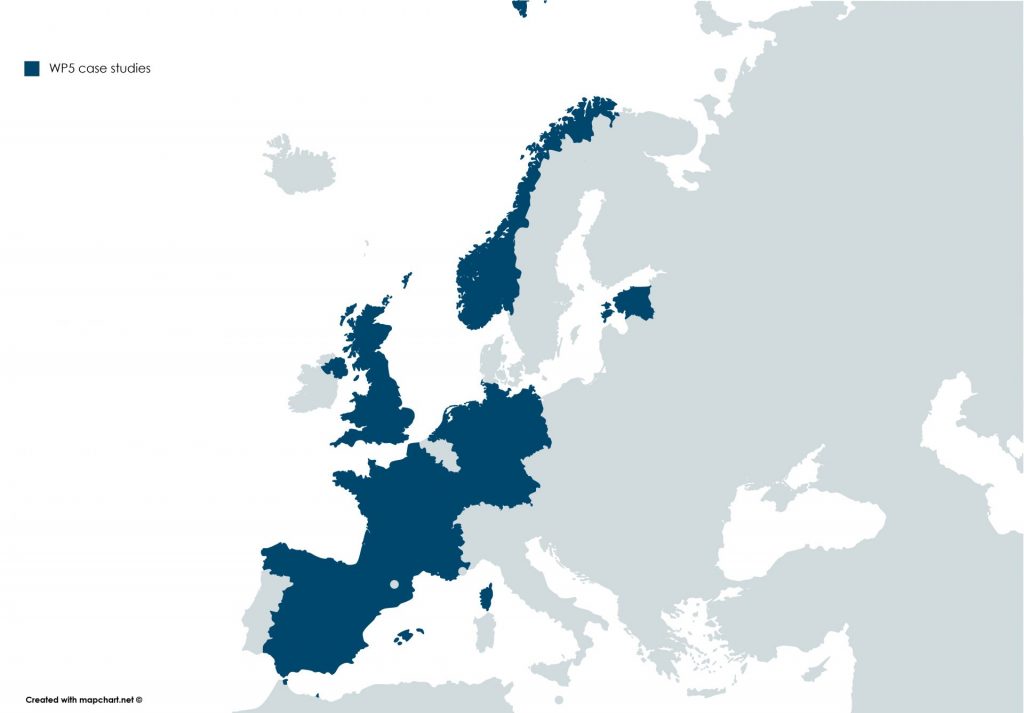Practices of External Collaboration for Policy Design (Work Package 5 – WP5)
Led by Tallinn University of Technology (Estonia), this work package is running from September 2018 until May 2021.
The WP5 team examines the conditions and practices of external collaboration in policy design, focusing specifically on e-participation platforms, with the aim of contributing to improved understanding of success factors of such initiatives.
It seeks to explore the influence of e-participation initiatives on policy design and collaboration with citizens, and to develop policy recommendations for further improvement of organisation and administration of e-participation initiatives. In its research, WP5 addresses the following questions:
- How are e-participation platforms launched and institutionalised?
- How is the interaction between the government and the non-governmental stakeholders organised and administered through the e-participation platforms?
- What are the critical success factors in organising and administering e-participation initiatives and the main lessons learned during the implementation of such initiatives?
To answer these questions, the WP5 team conducted seven case studies and looked into:
- National-, organizational -and individual-level factors explaining the establishment and functioning of e-participation initiatives,
- The evidence of the influence of e-participation initiatives on the actual policy design,
- The effects and implications of e-participation initiatives on collaboration with stakeholders and citizens.
Research
In the first step, the WP5 team carried out empirical analysis of recent e-participation initiatives with the objective of fostering collaboration between governments and citizens, in seven European countries (Estonia, France, Germany, the Netherlands, Norway, Spain, and the UK). The case studies were selected based on a joint case study protocol, following a multidisciplinary perspective, and covering politico-administrative, socio-cultural, and technical factors. See D5.1 Comparative case studies on e-participation.
The functioning of these e-participation platforms was further investigated by a comparative analysis of the cases, with a special emphasis on the “supply-side” of e-participation – the administrative and organizational context of such initiatives. See D5.2 Organising for e-participation: Learning from European Experiences.
Based on the empirical findings from the case studies, the WP5 team aimed at systematising critical institutional aspects in the adoption of e-participation. They presented a list of supply-related success factors of e-participation, which provides valuable information to policymakers who are involved in the establishment of new and improvement of existing e-participation platforms. These results are easily accessible in the form of a Policy Brief offering recommendations and might contribute to the development of both existing and new e-participation initiatives. See D5.3 Success factors for organizing and administering e-participation Policy Brief.
Results and findings
The research carried out in WP5 demonstrates that the impact of technology on the public sector is strongly mediated by the institutional context that frames the ways public sector interacts with citizens and other governmental and non-governmental units contributing to participatory policymaking. The organisational setup, process design, managerial quality and allocated resources play a crucial role in the collaborative efforts ensuring the functioning, continuous improvement and eventual sustainability of the e-participation platforms. Multifaceted organisational structures and processes combined with the complexity of the surrounding societal and political context make e-participation systems prone to fail and require them to be managed as a process of learning and adaptation rather than a static technological product. The case studies show that due to barriers in the institutional framework and relevant processes, e-participation platforms may end up struggling with low demand and acceptance. There is a need to re-think how governments should be vertically and horizontally integrated in the days of fast-changing technology in order to constantly adapt the system to contextual changes. As a result of comparative analysis of case studies, four groups of supply-related success factors have been elaborated: 1) the factors related to organisational design, 2) the factors related to participatory process, 3) the factors related to management, and 4) the other supply-related success factors. Considering that the supply-related success factors are the ones over which the government has direct influence, WP5 has outlined practical challenges that public administrations face in the organisation and administration of e-participation platforms in order to provide a systematic framework for addressing them in the future.
Scientific publications
The WP5 team is currently working on two journal articles and an edited volume (including single-country case studies) where their research will be further developed and elaborated.
The team
Led by Tallinn University of Technology (Estonia), the WP5 team included partners in six countries: Cardiff University (The UK), Erasmus University Rotterdam (The Netherlands), French National Centre for Scientific Research (CNRS)/ Grenoble Institute of Political Studies (France), University of Louvain (Belgium), and University of Potsdam (Germany).















